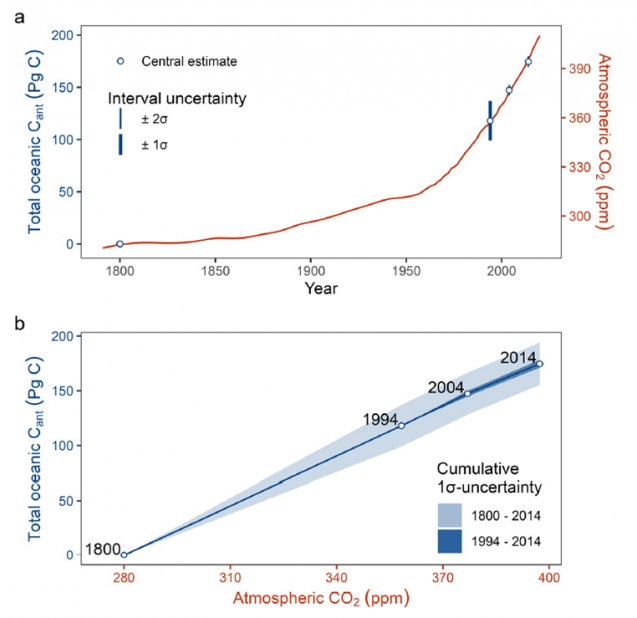A new study shows that the ocean recently absorbed a decreasing proportion of the CO2 emissions we produce. This trend could persist as climate change intensifies.
The ocean plays a crucial role in absorbing carbon dioxide (CO2) from the atmosphere, resulting from human activities like burning fossil fuels, cement production, and changing land use, such as deforestation. It takes in about 30% of the CO2 we release. Initially, this CO2 is absorbed at the ocean's surface and then transported to the deep ocean, where it is stored for centuries. In this manner, oceans function as a natural carbon sink, which is crucial in mitigating climate change.
However, a recent study led by the 4C researcher Jens Daniel Müller from ETH Zürich, detected a recent decrease in the ocean’s ability to store anthropogenic CO2, when comparing the uptake between 2004 – 2014 to the previous decade.
The results of this 4C-funded study indicate that, while the ocean still acts as a significant CO2 sink, its ability to store anthropogenic CO2 decreased during the second decade investigated. Specifically, the amount of anthropogenic CO2 absorbed by the ocean from 2004 to 2014 was 15±11% lower than what was anticipated based on the relationship between ocean uptake and atmospheric CO2 increase from 1994 to 2004. This means that the ocean is absorbing a smaller proportion of the CO2 emissions we produce. According to previous studies, this trend is expected to continue as climate change intensifies. The weakening of the ocean carbon sink capacity is attributed to a reduction in the ocean buffer capacity and changes in the global ocean circulation.
These findings have significant implications for policy. We need to account for this anticipated decrease in CO2 uptake when setting goals for CO2 emissions if we aim to reach net zero emissions by 2050.
The top graph illustrates the exponential rise in atmospheric CO2 over time. Nevertheless, the lower graph reveals that marine CO2 is not increasing at the same rate as atmospheric CO2. Source: Müller et al. 2023 (https://doi.org/10.1029/2023AV000875)
The 4C project aims to improve our understanding of the mechanisms governing the carbon cycle, including the extent to which human-generated CO2 impacts climate change and, vice versa, how climate change affects the carbon cycle. Ultimately, this knowledge will help make more accurate predictions that can inform policy decisions. In this regard, this study has played a key role in confirming that the ocean's capacity to absorb carbon is vulnerable to the effects of climate change.
Reference: Müller J.D., Gruber N., Carter B., et al. (2023). Decadal trends in the oceanic storage of anthropogenic carbon from 1994 to 2014. AGU Advances 4: e2023AV000875. DOI: 10.1029/2023AV000875


